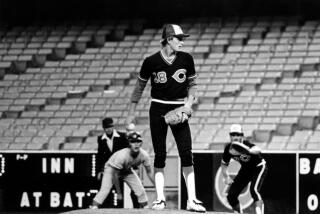Major Strides : In their pursuit of a career in baseball, there were stops on the road from Denver to Maine and points in between. Today five players from the Valley have reached the big time in a big way.
- Share via
Whitey Herzog popularized the Bullpen by Committee concept that helped lead his St. Louis Cardinals to the 1985 World Series.
As with just about every idea that works in the major leagues, other managers soon started forming their own versions of Herzog’s relief corps.
The Detroit Tigers’ committee, however, was about as successful as the committee to elect Walter Mondale for president.
Sure, they had the left-handed Willie Hernandez serving up the same screwballs that earned him the American League’s 1984 Cy Young and Most Valuable Player awards. But the right-handers of the group included such stoppers as Jim Slaton, Bill Campbell and Randy O’Neil. Hardly Gossage, Fingers and Sutter.
Manager Sparky Anderson could have demanded that the front office take its checkbook and trudge out into the free-agent market to find him a right-handed relief ace, but he believed that the best possible reliever was already on his staff.
So when the Tigers go to spring training next season, Eric King will begin what Anderson figures to be a long career as one of the premier relievers in the game.
“Very simply, we needed more than one guy down there in the bullpen,” Anderson said. “We feel that Eric is the one other guy who can stop them for one inning. He can come in and just blast you right out of there. He’s a great one, a really great pitcher.”
King, who played at Royal High and Moorpark College, proved that during his rookie season in 1986.
He was 11-4 with a 3.51 earned-run average and was named last week to Baseball Digest’s rookie all-star team.
“When I think about it, I’m really amazed at how well I did,” said King, who struck out 79 and gave up only 108 hits in 138 innings. “It was really a shock.”
But most of his success came as a starter, a fact not lost on Anderson.
“He did an outstanding job as a starter,” Anderson said, “but we really had to shore up the bullpen and he was just the guy to do it. He’s outstanding, either as a starter or out of the bullpen.”
King understands that he’s in no position to charge into the manager’s office and demand to remain in the starting rotation.
“Whatever they want me to do, I’ll do,” he said. “I’m willing to take anything they give me. I’ve been asked before which I like best. It’s really hard to say. They’re both exciting.”
C’mon, Eric. Starting is a lot more fun. You pitch your seven or eight innings, then take the next four days off. It’s a cushy job with a big paycheck.
If he did let out a sigh when told of the change in duty, Anderson didn’t hear it.
“When we told him of the switch, he didn’t say a word,” Anderson said. “Eric doesn’t care where or when he pitches. Not that it would matter. I didn’t really care what he thought. He’s our relief pitcher now.”
It won’t be the first time that King has come out of the bullpen. He began his professional career as a reliever in 1983 at Great Falls, the San Francisco Giants rookie league affiliate, and remained in the bullpen the following season when he was moved up to Class-A Clinton.
So, despite pitching the better part of last season as a starter, King isn’t spending sleepless nights worrying about the readjustment.
“Relieving is really no big thing,” he said. “The big thing was the first time getting in and trying to get over that initial nervousness. But that’s all behind me now.”
And that has to be a big relief to a manager in search of someone to plug a big hole in his bullpen.
More to Read
Go beyond the scoreboard
Get the latest on L.A.'s teams in the daily Sports Report newsletter.
You may occasionally receive promotional content from the Los Angeles Times.










